A sampling of messages beginning with sisters Donna and Darlene Wallach’s August departure from Cyprus, breaking the siege with Free Gaza, to accompanying Palestinians trying to fish and farm in November
by Donna Wallach
Apartheid Israel = Palestinian human rights denied
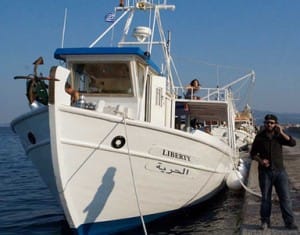
All of Israel, East Jerusalem, the West Bank and the Gaza Strip is Occupied Palestine. The Israeli Occupation has been continuing and expanding since 1948.
The Gaza Strip, located along the coast at the southern end of Palestine, has been occupied by Israel since 1967. The apartheid Israeli government has not allowed the Gaza Strip to develop economically. The Gazans are restricted as to what kind of businesses they can open, who they can trade with internationally and what products they can make – they are not permitted to have any business which would compete with Israeli markets.
Since 2006, the Gaza Strip has been under Israeli genocidal siege. Israel closed all the border crossings, not letting people or supplies in or out. Even very sick people who urgently need medical care in hospitals inside Israel or in Egypt are not permitted to leave the Gaza Strip. By now, over 215 Palestinians have died because they were refused permission to receive the medical care that would have saved their lives. Scores of children have been among those who died.
In Gaza Strip, 10 percent of the children suffer from malnutrition, stunting their growth and development. Eighty percent of the population is totally dependent on UNWRA for their food. According to the United Nations Office for the Coordination of Humanitarian Affairs, “Most U.N. food assistance only makes up a portion of the daily caloric needs.”
Gaza has fertile land where crops used to grow; however, Israeli soldiers have repeatedly destroyed the crops and the irrigation pipes, depriving the Palestinians of their livelihood and the ability to feed their families.
Their drinking water has also been affected. In December 2007, due to lack of necessary spare parts for the regular repair and maintenance of the water network, “three wells in Gaza City were unable to operate at their full potential, leaving 140,000 people with access to water for only 4-6 hours per day.” In the summer, temperatures in Gaza are in the 100s. Water treatment projects in various cities in the Gaza Strip are on hold because Apartheid Israel won’t permit the necessary equipment to be imported.
Gazan students who have graduated from high school and want to attend university can’t continue their studies in the universities inside the West Bank. Those students with scholarships, even Fulbright scholarships, are denied the necessary visas by Israel to leave the Gaza Strip to arrive to their destined campuses worldwide.
All of us in the Free Gaza Movement, whether passengers on the boats or part of the support teams, are outraged that 1.5 million Palestinians are being collectively punished by the apartheid policies of the Israeli state. The governments of the world and international organizations have the power to force Israel to open the borders to allow the Palestinians to travel in and out of Gaza, and the West Bank, too; to allow the transport of food, medicine, school books, fuel and replacement parts for machinery and hospital equipment. They are standing by and watching this collective punishment continue unabated.
This deadly siege on Gaza Strip is a slow 21st century-style genocide. The Palestinian people are being slowly but surely killed, their culture destroyed and their families torn apart. The entire world is watching while this happens, has been watching this happen for 60 years. The Free Gaza Movement says NO! We are starting by breaking the siege – it has to end, we demand that it end now. We are sailing on two boats to break this deadly siege. Please join us, tell everyone you know that the Israeli siege of Gaza must end!
Statistics from “Gaza Strip Humanitarian Fact Sheet December 2007,” prepared by the United Nations Office for the Coordination of Humanitarian Affairs
Arriving in Gaza: Breaking the siege
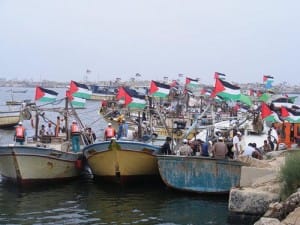
Not until we were approaching Gazan waters did we finally hear that Israel said they would not stop us, we were SOOOOOOOO happy. Then our communications systems were finally working again.
The sea journey entering Gaza port was amazing! Many boats came out to greet us with LOTS of people onboard. Even before we entered the small port, young men swam out to meet us. As we entered small port, many more boats crowded with cheering people onboard greeted us. All the boats had Palestinian flags waving in the wind.
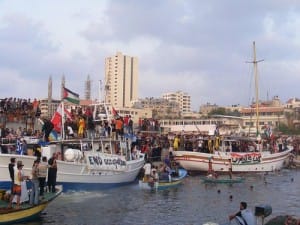
I have never in my life experienced such joy. I was so overwhelmed, as I think we all were. Many of us were crying.
Most of the original passengers and both of the boats sailed back to Cyprus yesterday, Aug. 29, and they arrived in Cyprus today. Some of us remained behind here in Gaza to do some volunteer work and solidarity work and to continue some actions to break the siege and finally to end this genocidal siege.
The situation here in Gaza is VERY difficult. The poverty, the lack of resources, the oppressive siege and occupation is in your face. I used to come to Gaza every Saturday between 1991 and 1993 and I was here for a week in 2002. It was very bad back in those years, but I have never seen it so bad as it is now. Often times there are practically no cars in the streets because of the lack of fuel. People can walk in the streets because there are few cars driving about. Many stores are closed, the iron doors locked shut or even if they have fancy glass windows and doors, they are closed and often the shelves are empty.
Here in Gaza people don’t need to apply for building permits from the Israeli government like in the West Bank, but they can’t build because there are no materials – Israel won’t allow building materials in. I see unfinished buildings all over the place. People want to rebuild their homes that have been demolished, but they can’t.
The fishermen use cooking oil to power their boats. I have heard that some people use the cooking oil to power their cars too.
The situation here is VERY bad. The siege MUST end! All of us must do something to put pressure on the Israeli government, the American government, the Egyptian government to open all the borders – to let Palestinians travel freely and to allow medicines, materials, all the supplies that the Palestinians need to enter and to allow and even to encourage the Palestinian economy to flourish.
Gazan fishing action
Gaza City, Gaza Strip, Palestine, Sept. 21 – On Sunday, Sept. 21, about five fishing boats trawled the coast from the Gaza City port. I was on a boat that had been water cannoned the previous day and many of their nets had been damaged as a result. The crew spent most of the morning repairing the nets and at 11:40 a.m. we finally left the port for a full day of trawling.
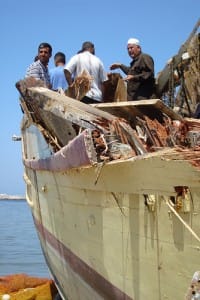
After some time passed and the gunboat was not in the area, the captain of our boat steered towards the north. There are larger fish in the northern Gazan waters, apparently very tasty – and the fishermen REALLY wanted to catch as many of those fish as they could this day.
As we continued in our northeast direction, we saw the gunboat with the water cannon pass in the distance. At 1:40 p.m. we saw another regular sized Israeli naval gunboat approaching. It moved alongside in a threatening move as if to say, don’t go out any further into the sea! Ten minutes later the water cannon gunboat arrived and dowsed our boat and most of the crew with high powered blasts of water. One crew member, Ahmed, fell on the slippery deck and hurt his knee.
For some unknown reason the gunboat only water cannoned us once for a brief time, causing no damage to the boat or the nets. I do not know what impact the water cannon has on the fish, much of the high powered blasts of water hit the sea and often times the net too. In any case, as in previous occasions, the smaller gunboat positioned itself on the opposite side of our boat from the water cannon gunboat, ready to shoot and posing a threat, besides blocking us in from escape from the deluge of high powered water. In addition, there were strong waves from the movement of the larger gunboat making our boat rock from side to side and increasing the danger from the blasting water and wet, slippery deck.
Later on in the afternoon, around 3:10, another Israeli naval gunboat approached very quickly and forced us away from our position in the north of the Gazan territorial fishing waters. Soldiers were shouting to go south, among other things. The gunboat continued to circle our boat in very close proximity and was threatening to shoot. As we changed course and headed south, the gunboat proceeded to circle the boat for a while and then left.
After the gunboat had been gone for a while, the captain of our boat changed course again and returned to the north, heading closer to shore. The goal of catching that specific fish had not been abandoned.
At 4 p.m. an Israeli naval gunboat quickly approached. As it drew nearer I spoke on the VHF informing the Navy that “we are Palestinian fishermen, we are pulling in our net of fish. We have the right to be here. These are internationally recognized Gazan fishing waters. Over.” I repeated this a number of times.
Finally a soldier on the gunboat arrogantly replied: “You don’t have the right to be here. Take your fish and go south.” We continued to pull in the net and headed south and out to sea. Only two netfuls of fish and neither of them were big catches; however, they did succeed in catching a number of boxes of the fish they were fishing for and for that they were happy.
The fishing boat headed into port after the sun set and after eating the evening meal breaking the Ramadan fast for the day. They dropped me off, thanked me for my support and headed back out to sea for an entire night of fishing. They had been fishing for two days and nights already.
The Israeli Navy controls the Gazan territorial waters under its illegal occupation of the entire region and its siege of the Gaza Strip. Every day Palestinian fishermen face very real threats to their livelihood, their wellbeing and their lives – a direct result of this decades long Israeli Occupation and this two-year-long siege. The Palestinian fishermen have the human right to a livelihood – to go out and fish, earn a living, feed their families and live their lives. The siege must end; the Occupation must end.
Fishing and farming is treacherous under occupation
Oct. 19 – Both of us are doing well. We accompany Palestinian fishermen out into the sea while they trawl for fish. The Israeli naval gunboats are out there every day patrolling internationally recognized Gazan territorial waters. Some days with internationals onboard they go out eight or nine miles and they are “greeted” by machine gun fire and recently high powered water cannon. Some days the gunfire starts at six miles out; yesterday the gunfire was at three miles out. The gunboat with the water cannon didn’t get close, but it could be seen in the distance.
When internationals are onboard the boats, the Israeli soldiers on the gunboats don’t shoot into the boats nor do they shoot the fishermen or arrest them, at least not yet. However the large gunboat with the water cannon is causing a lot of damage to the boats and some people have been injured – at least one fisherman and three internationals so far. I’m assuming that more fishermen have been injured, but they haven’t told us. The pressure from the water cannon is extremely strong. It breaks windows in the wheel houses and breaks the wood panels of the wheel house itself. I am amazed that nobody has been blown into the sea yet while being blasted by the water.
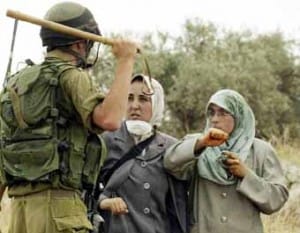
During numerous invasions over the past few years, they have destroyed all the farms in a 300- to 500-meter area from the Green Line inward into Gaza Strip. Thousands of olive trees, guava trees, citrus trees, date trees were destroyed along with many other crops. Some farmers cannot reach their land to even stand on it. The danger is too great of getting shot and killed. There have been instances of farmers working their fields and Israeli terrorist soldiers shot them and killed them. Some of the farmers have succeeded to replant their olive trees for the second and third time, we were harvesting those olive trees.
The Gaza Strip is small. I’m not remembering the total square kilometers or miles, but the width at the widest is something like 6 or 7 miles and the length is less than the distance of a marathon. About 1.4 million Palestinians live here. Most of the agricultural land has been destroyed, making it extremely difficult for people to have healthy, affordable food.
Some of the farmers described Beit Hanoun as a paradise, the agricultural land very good soil for all the crops they grew. Now something like 80 percent of the population is dependent on food aid, which is not healthy fresh vegetables and fruits, but sugar, white flour and some kind of oil, maybe salt too.
Since the fishermen are limited in the distance they can go to fish, they often come back with very small catches. So the price of fish is expensive and many people can’t afford it. This is a disaster, since fresh fish is a very healthy food source. Also, the Palestinian agriculture and the fish were Palestinian sources of food with the money staying inside Gaza Strip. Now inside the stores many labels are in Hebrew, products produced inside the Israeli state.
Israel’s everyday war crimes
Oct. 21 – Darlene and I and other Internationals (International Solidarity Movement volunteers) have continued to go out on the fishing boats, accompanying the fishermen when they trawl for fish up and down the Gazan coast. In the recent few weeks the Israeli Navy has been sending their largest gunboat, which is armed with a very high powered water cannon that wreaks havoc on the boats and causes lots of destruction, besides injuring fishermen and volunteers on the boats.
At the beginning the water cannon boat would only sometimes appear, but in recent weeks it is always there. The boat I was on a few days ago, the engine of the boat was damaged, two windows in the wheelhouse were broken, the flashing light on the top of the wheelhouse was blown off and broken and wooden panels in the wheelhouse were damaged.
What was the horrendous violation they committed to receive such punishment? They were trawling for fish in Gazan territorial waters 7 miles out from shore – everything totally legal and within all international laws. The criminals of course are the Israeli Navy. They commit war crimes on a daily basis – every day illegally patrolling the Gazan territorial waters, every day shooting at or near fishing boats, blasting fishing boats and fishermen with high powered water cannons and, even worse, actually shooting and seriously injuring fishermen who are trying to provide a livelihood for their families.
Recently we have been visiting Palestinian farmers who live close to the Green Line, the border with Israel. In 2007, I think, Israel declared a 300- to 500-meter buffer zone along the entire eastern side of the Gaza Strip by invading and destroying the crops and trees which the Palestinians depended on for their livelihood and which provided a healthy and independent food source for the Palestinians living in the Gaza Strip. Thousands of dunams of land was destroyed – olive trees, citrus trees, date trees and many other crops, along with the irrigation pipes. Many of these farmers still can’t get to their land; it is too dangerous for them.
The war crimes that are being committed by Israel on a daily basis are so vast it is mind boggling! The patients who need treatment and are denied access to it is in the hundreds if not thousands. Recently we received an email sent by Amnesty International with the names and ages of six children – the youngest was 5 months the oldest is 6 years. They all have congenital heart problems and all need heart surgery.
None of the hospitals in Gaza can do the surgeries because of the siege. They don’t have the necessary equipment or supplies. A team of Israeli doctors tried to enter to perform the surgeries; they were denied entry into Gaza Strip. A team of international doctors had arrived to Mokassed Hospital in Jerusalem, prepared to do the surgeries on the children, but each child and his mother or grandmother were denied entry into Israel; Israel claimed that the mothers or grandmothers were a security risk.
One of the children has been prevented from entering Israel for this life saving surgery six times already. Soon there is going to be a team of, I think, French doctors to arrive to Mokassed Hospital to perform the surgeries on these children. There is no promise that Israel will allow them to pass accompanied by their mothers or grandmothers.
Weed pulling threatens armed Israeli soldiers
Al-Faraheen, Abasan Al-Kabeera, Gaza Strip, Palestine, Nov. 12 – On Wednesday, Nov. 12, five international volunteer Human Rights Observers, most of them members of ISM Gaza Strip, went to Al-Faraheen, east of Khan Younis to pull weeds in the radish garden at the farm of Jaber Abu-Rageliyah and Leila Abu-Daga and their five children and to establish an international presence. They live on a farm just 700 meters from the fence which separates Gaza Strip, Palestine, from Israel. It is a very dangerous area for them to live and farm.
On May 1, 2008, Israeli occupation force soldiers invaded Al-Faraheen Abasan Al-Kabeera and destroyed all the trees, crops and chickens on Jaber’s farm – ruining his livelihood and denying him and his family the healthy, organically homegrown food they eat. Israeli occupation force soldiers have been destroying farms all along the eastern border of the Gaza Strip, 300-500 meters deep, to enforce an arbitrarily declared “buffer zone.”
Every tree, every crop, every chicken farm, every sheep farm and every hot house within this area bulldozed, demolished, destroyed – this agriculturally rich soil made into a desert for hundreds if not thousands of Palestinian farmers. They are still denied their right to farm their lands and are often shot at when they attempt to farm. Jaber has been shot at numerous times in the past weeks for weeding his now tiny garden just 100 meters from his farmhouse.
On this warm autumn day, a few volunteers arrived early and met Jaber waiting at the gate outside the temporary house where his wife and daughters spend the night. The windows to the farmhouse have been shot out and it is now too cold for them to sleep there. Jaber and his young son sleep in the farmhouse each night to establish their presence and to protect it from possible demolition.
Leila and the two youngest daughters greeted their guests and in traditional Palestinian hospitality invited them to a delicious breakfast of yogurt, olives, babaganooz, homemade bread, hawayig (a special Palestinian jam) and of course very sweet tea. Finally it was time to go to work, pulling weeds in the radish garden.
As soon as the volunteers began pulling weeds they witnessed at least three jeeps driven by Israeli occupation force soldiers on the road along the border fence. The soldiers often stop their jeeps, get out and lie on the ground and shoot at unarmed Palestinian farmers who have come to their fields to work. All the farmers are struggling to return to their farms to provide a livelihood and sustenance for their families. There are also towers built every 5 kilometers along this fence and armed Israeli occupation force soldiers sit in these towers and shoot at and spy on Palestinians who live in the area.
Very soon more HRO volunteers arrived and joined the weed pullers. After a while amidst the chatter, the newer volunteers wanted to see the banner hung on the destroyed chickenhouse, next to the radish garden; it says “International Presence” in big black letters. The banner is hung each time the volunteers come to the farm.
This day, as the volunteers stood looking out towards the destroyed fields and the border fence, they noticed that soldiers had gotten out of the jeeps. Almost immediately the soldiers opened fire. One of the volunteers quickly went to get the bright yellow reflective vests that some of them wear when they work in the fields in the “buffer zone.” Two volunteers used the bullhorns they had brought and were yelling to the Israeli soldiers: “Stop shooting!” “We are unarmed!” “Palestinian farmers have the right to farm their land!” This time the shooting only lasted a few minutes.
Soon after, the HRO volunteers noticed lots of gunfire and explosions in El-Gerrara, another small farming community to the north of Al-Faraheen. Then they heard and saw two helicopters in the sky. A quick phone call revealed that special forces of the Israeli occupation force army had invaded El-Gerrara and the resistance fighters were battling against the invasion, to protect the people and the land from this illegal incursion.
Later on the volunteers learned that four young Palestinian men had lost their lives defending the lives and the land of El-Gerrara. All were deeply loved by their families nd friends who are now mourning over this very big loss and sacrifice. All the men were 30 years old and younger and were married with young children at home.
As soon as the shooting and explosions were over, all the volunteers, Jaber and his friends resumed pulling weeds, but much time had passed and soon the Human Rights Observer volunteers had to leave. Only half of the radish garden had been weeded. There were enough volunteers to have finished the weeding that day, but too much time was wasted during the shooting.
Such is the everyday existence of the Palestinians. Life is always interrupted by the Israeli occupation force soldiers, the occupation and the siege.
Donna Wallach can be reached on her cell phone at +972-59-8836420 or by email at cats4jazz@gmail.com. Revolutionary journalist Kiilu Nyasha comments with this latest dispatch: “This is another report (and I’ll be sending more) from my dear friend, Donna Wallach, whose courage never ceases to amaze me. For those who don’t know Donna, she lives in the Bay Area and has also been an active supporter of Mumia and Leonard and all political prisoners here in the U.S. She once lived in a kibbutz in Israel where she became familiar with Israel’s oppression of the Palestinians and was outraged enough to dedicate her life to liberating the Palestinians. Her twin sister, Darlene, as you may know, was recently kidnapped, jailed and deported from Gaza.” Listen to the Nov. 21 Democracy Now! interview with Darlene speaking on her cell phone from prison. And read more of Donna’s dispatches on the International Solidarity Movement site.





